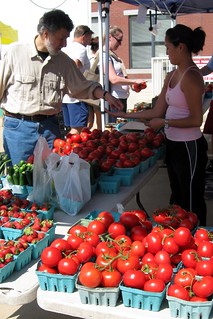17 July 2014. Arcadia Biosciences, an agricultural biotechnology company in Davis, California received a patent for its engineered tomato that ripens slower after harvesting. Patent number 8,772,606, “Non-transgenic tomato varieties having increased shelf life post-harvest,” was awarded by the U.S. Patent and Trademark Office on 8 July to two inventors and assigned to Arcadia Biosciences.
The technology covered by the patent seeks to lengthen the amount of time vine-ripened tomatoes can sit on the shelf, and still have the texture, firmness, and taste desired by consumers. Traditional breeding methods, says Arcadia, are labor intensive and can take years before producing noticeable results, which even then may add only modest amounts of time to shelf life.
Many tomatoes sold in stores are picked before ripening, says the company, which allows them to develop a red color during transit and storage, but they lose the vine-ripened flavor sought by consumers. In addition, Arcadia is seeking a process that would not require introducing a gene from another plant to slow ripening, given some consumer resistance to transgenetic modification.
The Arcadia solution covered by the patent induces a mutation in at least one of the tomato’s non-ripening genes that changes the sequence of genetic molecules in the tomato to preserve the color and firmness of the fruit after harvesting. The patent also covers proteins and amino acids produced by the mutated non-ripening genes, as well as food products produced by tomatoes grown with the altered genes.
Arcadia’s technology for extending shelf life in tomatoes and other produce is based on a genetic screening technique called Targeting Induced Local Lesions in Genomes or TILLING, first developed at Fred Hutchinson Cancer Research Center in Seattle. With TILLING, Aracadia produces seeds and plants with the desired mutations, then screens the DNA from plants until the desired mutation and traits are identified.
The company says it first developed its extended shelf-life technology under a Department of Defense contract, where DoD was seeking ways of preserving fresh produce for longer periods in remote regions. “This technology,” says Arcadia CEO Eric Rey in a company statement, “offers tremendous value for both producers and consumers of tomato food products, including fresh market tomatoes, canned tomatoes, ketchups, soups, sauces, pastes and juices.”
Read more:
- Lab Chip Device Developed to Test Engineered Plant Traits
- Biotech Partnership to Develop Non-Ricin Castor Plants
- Gene Modified Potatoes Developed with Blight Resistance
- Engineered Hemp Delivers High Volume of Healthy Oleic Acid
- Genetic Mechanism to Increase Tomato Production Explained
* * *


 RSS - Posts
RSS - Posts